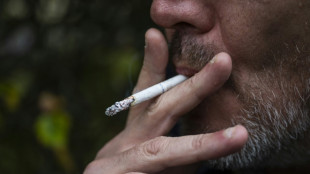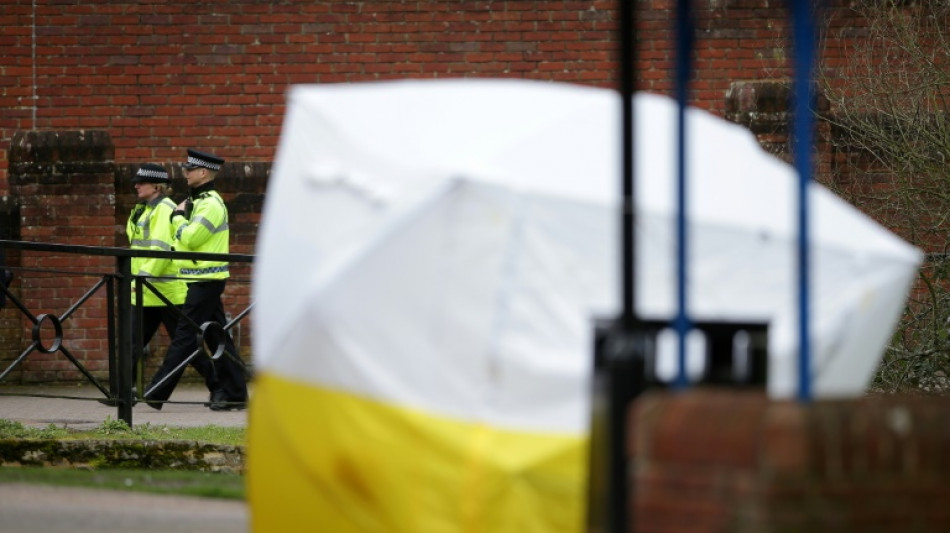
-
 Iran Nobel winner released for three weeks, 'unconditional' freedom urged
Iran Nobel winner released for three weeks, 'unconditional' freedom urged
-
Red Cross marks record numbers of humanitarians killed in 2024

-
 Johnson's Grand Slam 'no threat', says World Athletics boss Coe
Johnson's Grand Slam 'no threat', says World Athletics boss Coe
-
Qatar's emir and UK's Starmer talk trade as state visit ends

-
 Cuba suffers third nationwide blackout in two months
Cuba suffers third nationwide blackout in two months
-
Russia, Ukraine to send top diplomats to OSCE summit in Malta

-
 Spanish royals to attend memorial service for flood victims
Spanish royals to attend memorial service for flood victims
-
LPGA, USGA new policy requires female at birth or pre-puberty change

-
 Stick to current climate change laws, US tells top UN court
Stick to current climate change laws, US tells top UN court
-
British Museum chief says Marbles deal with Greece 'some distance' away

-
 Pope Francis receives electric popemobile from Mercedes
Pope Francis receives electric popemobile from Mercedes
-
Gaza civil defence: thousands flee Israeli strikes, evacuation calls

-
 Trump names billionaire private astronaut as next NASA chief
Trump names billionaire private astronaut as next NASA chief
-
Pidcock to leave INEOS Grenadiers at end of season

-
 Seoul stocks weaken, Paris advances despite political turmoil
Seoul stocks weaken, Paris advances despite political turmoil
-
South America summit hopes to seal 'historic' trade deal with EU

-
 DAZN awarded global TV rights for Club World Cup
DAZN awarded global TV rights for Club World Cup
-
Top executive shot dead outside New York hotel
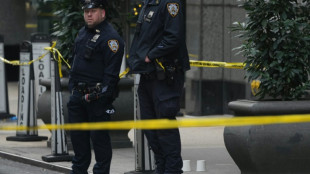
-
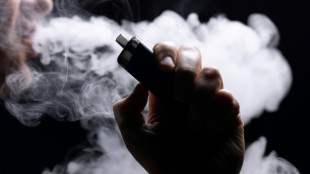 Vaping while still smoking unlikely to help quitters: study
Vaping while still smoking unlikely to help quitters: study
-
British Museum chief says Parthenon Marbles deal with Greece 'some distance' away

-
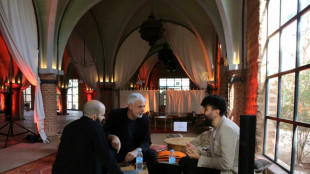 'Creating connections': Arab, African filmmakers gather at Morocco workshops
'Creating connections': Arab, African filmmakers gather at Morocco workshops
-
Iran frees Nobel winner for three weeks, sparking calls for 'permanent' release

-
 Brazil's Minas cheese gets added to UNESCO list
Brazil's Minas cheese gets added to UNESCO list
-
Top US executive shot dead in New York City: media

-
 Trump's nominee to run Pentagon hangs by a thread
Trump's nominee to run Pentagon hangs by a thread
-
GM announces more than $5 bn hit to earnings in China venture

-
 World chess champ Ding, teen challenger tied past halfway mark
World chess champ Ding, teen challenger tied past halfway mark
-
Georgia police raid opposition offices as PM vows to curb protests

-
 S. Korea opposition begins push to impeach president
S. Korea opposition begins push to impeach president
-
Syrian army fights rebel offensive with counterattack

-
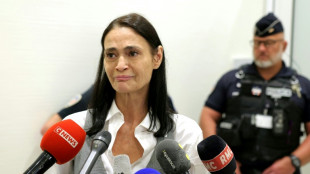 France court upholds Polanski acquittal in defamation case
France court upholds Polanski acquittal in defamation case
-
UK bans daytime TV ads for cereals, muffins and burgers

-
 Palace's Guehi to face no formal action over 'Jesus' message on rainbow armband
Palace's Guehi to face no formal action over 'Jesus' message on rainbow armband
-
UK faces trade balancing act with Trump, EU

-
 Iran releases Nobel Peace laureate Mohammadi on medical leave: lawyer
Iran releases Nobel Peace laureate Mohammadi on medical leave: lawyer
-
UNESCO grants heritage status to Aleppo soap as Syria war flares

-
 Ghana's illegal mining boom seeps into presidential election
Ghana's illegal mining boom seeps into presidential election
-
Inconsistent Spurs 'progressing in all aspects': Postecoglou

-
 France's Orano says Niger junta controls uranium firm
France's Orano says Niger junta controls uranium firm
-
Seoul stocks weaken, Paris edges up tracking political turmoil

-
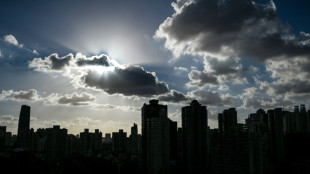 China reports warmest autumn since records began
China reports warmest autumn since records began
-
French marine park to close over law banning killer whale shows

-
 Thousands march demanding S. Korea president resign over martial law debacle
Thousands march demanding S. Korea president resign over martial law debacle
-
Taiwan romance novelist Chiung Yao dies at 86
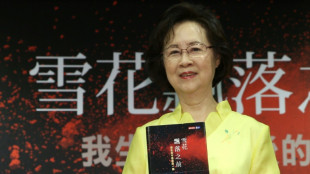
-
 In Angola, Biden promises to invest differently to China
In Angola, Biden promises to invest differently to China
-
Syrian army launches counteroffensive against rebels

-
 Evenepoel says 'long journey' ahead after postal van collision
Evenepoel says 'long journey' ahead after postal van collision
-
South Korea's day of rage as Yoon's martial law founders

-
 UK police question killer nurse Letby over further baby deaths
UK police question killer nurse Letby over further baby deaths
-
Cameroon curator Kouoh is first African woman to lead Venice Biennale


'Innocent' British nerve agent victim caught in global murder plot: inquiry
A British woman who died after being exposed to the Soviet-era nerve agent Novichok was unwittingly caught up in an "illegal and outrageous international assassination attempt", a public inquiry was told on Monday.
Dawn Sturgess, a 44-year-old mother of three children, died in July 2018 after spraying herself with what she thought was perfume from a discarded bottle containing the deadly chemical weapon.
Her death followed a failed poison attack against former Russian double agent Sergei Skripal in Salisbury, southwest England. The UK government has said it was "highly likely" Russia was behind the plot.
Skripal and his daughter Yulia were found unconscious on a bench in Salisbury in March 2018. They survived after intensive hospital treatment and now live under protection.
At the start of public hearings into Sturgess's death in Salisbury, inquiry lawyer Andrew O'Connor said the perfume bottle contained enough Novichok to poison "thousands" of people.
"It's no exaggeration to say the circumstances of Dawn Sturgess's death were extraordinary," he told the hearing.
"When Ms Sturgess was poisoned by Novichok four months after the Skripal poisoning, the real possibility emerged that she had been caught -- an innocent victim -- in the crossfire of an illegal and outrageous international assassination attempt," he added.
UK authorities believe that agents targeting the Skripals threw the perfume bottle away, making the two cases "inextricably interwoven".
The attempt to kill Skripal, on whom Russian President Vladimir Putin had sworn vengeance, plunged London-Moscow relations to a new low.
Britain blames the Novichok attack on two Russian security service officers who allegedly entered the country using false passports. A third has been named as the operation's mastermind.
All three are thought to be members of the GRU Russian intelligence agency. Russia, whose constitution does not allow extraditiona, has denied involvement and dismissed the inquiry as a "circus".
- Diplomatic ties -
Six years on, relations between the countries -- already hit by claims that Russia was behind the 2006 radiation poisoning of former agent Alexander Litvinenko -- remain in deep freeze.
The Sturgess inquiry will include closed sessions to investigate "private material" and intelligence related to the case. The Skripals will not give live evidence due to safety concerns.
Sturgess's family was "particularly concerned" about whether the UK government had taken appropriate steps to protect the Skripals and the wider public from collateral damage, according to O'Connor.
International arrest warrants have been issued for the suspects, but Theresa May, who was prime minister at the time of the attack, warned justice was unlikely.
She told the BBC last week that she hoped the inquiry would help "the family and friends of Dawn Sturgess feel it has got to the truth."
But "closure to all the people affected would only finally come with justice, and that justice is highly unlikely to happen," May added.
The Salisbury incident resulted in the largest-ever expulsion of diplomats between Western powers and Russia, and a limited round of sanctions by the West.
Those sanctions have now been outstripped by the West's response to Russia's 2022 invasion of Ukraine.
Wiltshire Police Chief Constable Catherine Roper said it was "important to remember that at the heart of this inquiry are Dawn's family and loved ones whose lives have been irreversibly changed".
"The purpose is to provide Dawn's family, friends and our wider communities in Wiltshire the opportunity to access the fullest possible information surrounding Dawn's death," she added.
Sturgess' family is to give evidence on Tuesday.
D.Schneider--BTB

